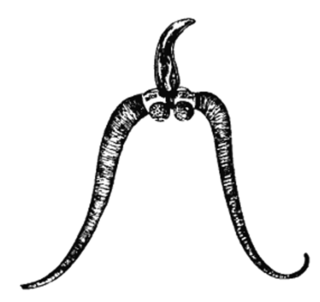 W
WBucephalidae is a family of trematodes that parasitize fish. They lack suckers, having instead a muscular organ called a "rhynchus" at the front end which they use to attach to their hosts. The characteristics of the rhynchus are used to help define the genera of the family. It is one of the largest digenean families, with 25 genera containing hundreds of described species. Bucephalids are cosmopolitan, having been recorded all over the world. They are parasites of fish from freshwater, marine, and brackish water habitat types.
 W
WThe Bucephaloidea are a superfamily of trematode flatworms, belonging to the large group Digenea. Many species are endoparasites of mollusks and fish. The name Bucephalus meaning "ox head" was originally applied to the genus Bucephalus because of the horn-like appearance of the forked tail (furcae) of its cercaria larva. By what Manter calls a "curious circumstance", horns are also suggested by the long tentacles of adult worms.
 W
WCephalogonimidae is a family of trematode parasites characterized by a genital pore located anterior to the oral sucker, at the apex of the body.
 W
WCephalogonimus vesicaudus Nickerson, 1912 is a species of digenean trematode parasite found in North America. This species typically infects the small intestine of North American soft shell turtles, but may also infect slider turtles, map turtles, mud turtles, green frogs, and ducks.
 W
WClinostomidae is a family of trematodes in the order Diplostomida.
 W
WCryptocotyle is a genus of trematodes from the family Heterophyidae. The definitive hosts of the parasites are fish-eating birds and mammals.
 W
WEchinoparyphium is a genus of trematodes. Intermediate hosts include snails, bivalves and fish. Definitive hosts are mainly birds and mammals.
 W
WEchinostomata is a suborder of the parasitic flatworm order Plagiorchiida. The suborder contains numerous species that are parasitic in humans.
 W
WEchinostomatidae is a family of trematodes in the order Plagiorchiida. It has been synonymised with Cathaemasiidae Fuhrmann, 1928.
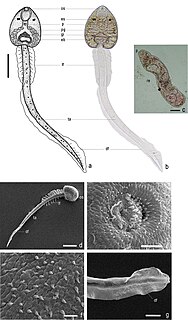 W
WHaplorchis is a genus of intestinal flukes in the family Heterophyidae.
 W
WHaplorchis taichui is a species of intestinal fluke in the family Heterophyidae. It is a human parasite.
 W
WHelicometra is a genus of trematodes in the class Opecoelidae. It is synonymous with Allostenopera Baeva, 1968, Metahelicometra Yamaguti, 1971, and Stenopera Manter, 1933. Its type species is H. fasciata (Rudolphi, 1819). They are distinguished by their unique spiral uterus, from which their name is derived.
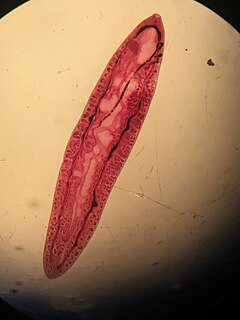 W
WHeronimidae is a family of digenean trematode parasites consisting of a single genus with a single species. The sole species of this family, Heronimus mollis is a parasite of the lungs of a number of species of turtles across North and Central America.
 W
WHeterophyes is a genus of trematodes, or fluke worms, in the family Heterophyidae.
 W
WHeterophyidae is a family of intestinal trematodes in the order Plagiorchiida.
 W
WLepocreadiidae is a family of trematodes in the order Plagiorchiida.
 W
WLepotrema is a genus of trematodes in the family Lepocreadiidae.
 W
WLepotrema amblyglyphidodonis is a species of lepocreadiid digenean parasitic in the intestine of marine fish. It was described in 2018.
 W
WLeucochloridium is a genus of parasitic trematode worms in the order Diplostomida. It Is the sole genus in the family Leucochloridiidae. Members of this genus cause pulsating swellings in the eye-stalks of snails, so as to attract the attention of predatory birds required in the parasites' lifecycle.
 W
WMetagonimus is a genus of trematodes, or fluke worms, in the family Heterophyidae.
 W
WPlagiorchis vespertillionis, also sometimes listed as Plagiorchis vespertilionis, is a species of trematode that parasitizes bats. It was described as a new species in 1780 based on specimens collected from a brown long-eared bat in Denmark. In 2007, it was documented within a human host for the first time.
 W
WPsilostomatidae is a family of trematodes in the order Plagiorchiida. They parasitise aquatic vertebrates as definitive hosts.
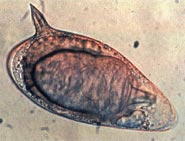 W
WThe Schistosomatoidea are a superfamily of digenetic trematodes.
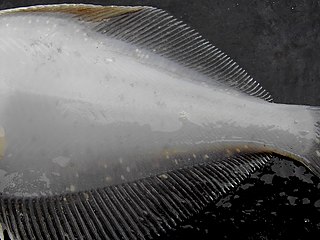 W
WStephanostomum baccatum is a species of parasitic flatworms in the family Acanthocolpidae.
 W
WThe Zoogonidae are a family of trematodes. They are the namesake family of the suborder Zoogonata in the order Plagiorchiida.